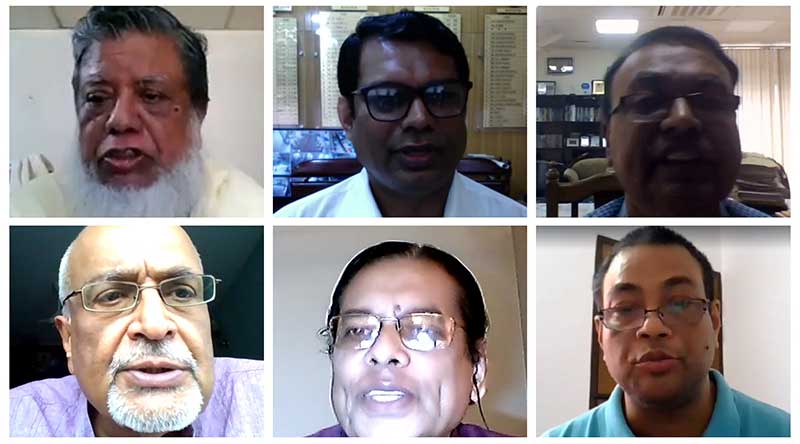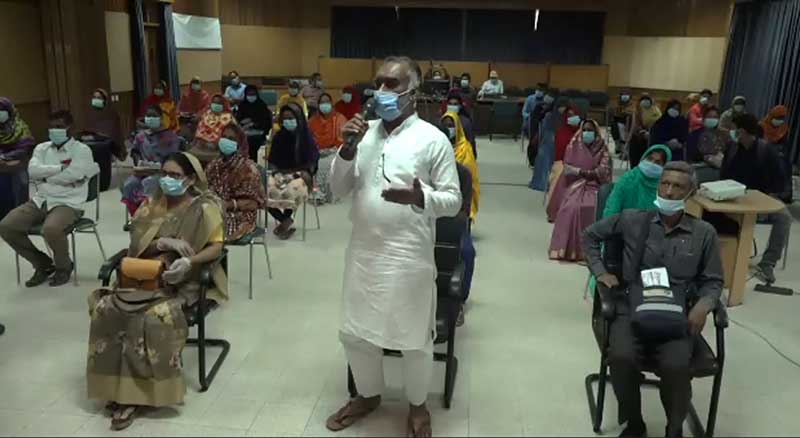
There is a need for increased collaborative effort amongst local level people, government representatives and government officials to ensure effective distribution of the relief efforts undertaken by the government in view of the COVID-19 pandemic and the recent flood situation in Rangpur district. In order to increase the effectiveness of service delivery in the local level, this coordination is indispensable. Effectiveness of the service delivery of these relief distribution programmes can be ensured by increasing public awareness through unconstrained flow of information and proper information dissemination.
These observations emerged from a virtual sub-national dialogue titled “Relief Supports in Response to COVID-19 and Flood: The Effectiveness of Public Service Delivery“. This event was organised jointly by Centre for Policy Dialogue (CPD) and Oxfam in Bangladesh, in partnership with RDRS Bangladesh and in association with Citizen’s Platform for SDGs, Bangladesh, under an ongoing project titled ‘Enhancing the participation of community-based organizations (CBOs) and civil society organization (CSOs) in democratic governance in Bangladesh’, supported by the European Union.
https://www.facebook.com/cpd.org.bd/videos/725689838286982/
The ongoing COVID-19 pandemic may have a long-term impact in the development progress of Bangladesh. The pandemic is likely to further weaken the pre-existing crisis and also disrupt the implementation of the SDGs. As per CPD’s findings, the COVID-19 pandemic has caused 1.3 crore people to be at risk in terms of employment, which is approximately 20.1% of the latest survey on labour force (2016-17). CPD also estimated that, the pandemic has caused the upper poverty rate to increase from 24.3% in 2016 to 35% in 2020. The total number of these “new poor” is around 1 crore 75 lac people. CPD’s Senior Research Associate, Mr Mostafa Amir Sabbih, shared these findings while presenting the keynote presentation. He presented an initial assessment of the effectiveness of government relief programmes to tackle COVID-19 pandemic and the flood in Rangpur district.
Many problems and challenges were observed in delivering the government relief programmes organised to tackle the COVID-19 pandemic and the flood. The beneficiary selection process was not transparent, especially with cash transfers, and the process was also not participatory in many cases. Beneficiaries at the local level are not well aware of hotline numbers and the relief related dispute settlements are not effective yet. The relief distribution for the flood inflicted people did not consider the intensification of flooding or the number of affected household members, rather, it was solely set on the basis on poverty rate. As per the data received from Ministry of Disaster Management and Relief for the four districts (Rangpur, Nilphamari, Kurigram and Gaibandha), allocation and distribution do not match demand.
Based on these observations, CPD put forward a set of recommendations. To ensure transparency in the beneficiary selection process, there needs to be proper publicity as per the implementation guidelines and the process should be made participatory. It needs to be ensured that the beneficiaries can receive the relief easily and without spending any unnecessary money. A better public awareness needs to be developed for technological supports, such as increasing public awareness regarding the availability and use of hotline numbers. CPD also recommended that there should be scope of dispute settlement at local level. It should be ensured that the relief reaches the people and in sufficient amounts, especially to the people who are most effected by the flood. Coordination between GO-GO and GO-NGO also needs to be increased to avoid service delivery duplication and to broaden the net.

Dr Debapriya Bhattacharya, Convenor, Citizen’s Platform for SDGs, Bangladesh and Distinguished Fellow, CPD presented a summary of the discussion at the session. Dr Bhattacharya stated that GO-NGO collaboration is critical to ensure effective delivery of the relief effort by the government. At central level, the government has to ensure the availability of relief. Coordination between local government, local authority and NGO is important to ensure transparency in delivering the relief packages, so that the person in need receives the relief.
Mr Md. Asib Ahsan, Deputy Commissioner of Rangpur, Government of Bangladesh attended the programme as the Guest of Honour. He stated that effective forwarding of information is very important to ensure transparency in delivery of the relief packages. Mr Ahsan also stated that anyone who received the cash transfer message but did not receive the cash amount can directly complain to him. He assured to take necessary steps in this regard.
Mr Md. Rashedul Islam, Director General, NGO Affairs Bureau, Prime Minister’s Office, Government of Bangladesh attended the programme as the Special Guest. During his speech he mentioned that NGO Affairs Bureau will continue its effort to ensure better coordination between GO-NGO to effectively deliver the government relief.
Advocate Md. Fazle Rabbi Miah, MP, Hon’ble Deputy Speaker, Bangladesh Parliament was present as the Chief Guest at the dialogue.On behalf of the organisers, Dr Fahmida Khatun, Executive Director, CPD, Dr Dipankar Datta, Country Director, Oxfam in Bangladesh and Mr Mohammad Abdur Rahman, Director, Program Development and Quality (PDQ), RDRS Bangladesh shared their views as introductory remarks at the dialogue. Professor Mustafizur Rahman, Distinguished Fellow, CPD chaired the event.
Around 100 representatives from local level organisations in Rangpur, Nilphamari, Kurigram and Gaibandha joined the dialogue virtually and shared the experiences at the grassroots level.
CBO representatives from Rangpur, government officials, academicians, development workers, NGO representatives, private sector representatives, representatives from civil society organisations, and media among others were also present at the dialogue.


